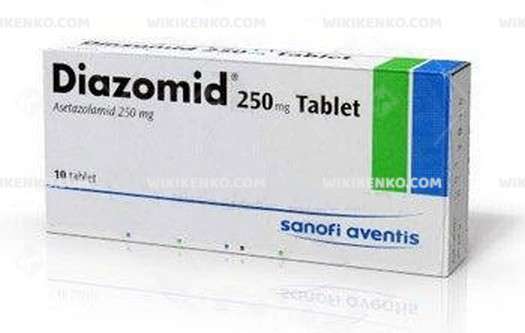Description
Diazomid is a renowned medication available in 250 mg tablets, offering effective treatment options for various conditions. Its active ingredient, acetazolamide, acts as a carbonic anhydrase inhibitor, targeting specific enzymatic reactions within the body.
By inhibiting carbonic anhydrase, it reduces the secretion of aqueous humor, leading to a desirable decrease in intraocular pressure for individuals with glaucoma. Additionally, its inhibitory effects on the central nervous system can aid in managing epilepsy.
Composition
Each Diazomid tablet contains 250 mg of acetazolamide as the active ingredient. The formulation includes carefully selected excipients such as lactose, corn starch, PVP K-30, tartrazine, and magnesium stearate. These components work harmoniously to ensure the medication’s efficacy and optimal patient experience.
Indications
Diazomid presents a versatile range of applications, making it an invaluable therapeutic option. The medication can be prescribed for the following reasons:
Treatment of open-angle or secondary glaucoma: Diazomid’s ability to reduce intraocular pressure makes it an effective treatment for glaucoma, providing relief and promoting ocular health.
Preoperative treatment of acute congestive glaucoma: It can be administered prior to surgery to alleviate acute congestive glaucoma, ensuring optimal conditions for a successful procedure.
Treatment of congestive heart failure and secondary edema caused by drugs: Diazomid aids in managing congestive heart failure and associated edema, offering relief and improving patients’ quality of life.
Adjunct to epilepsy treatment: As an adjuvant therapy, Diazomid complements the treatment of epilepsy by retarding abnormal paroxysmal and excessive discharge from central nervous system neurons.
Prevention and improvement of symptoms in acute altitude sickness: It can be utilized to prevent and alleviate symptoms associated with acute altitude sickness, providing comfort and facilitating acclimatization.
Precautions and Contraindications
It is vital to consider specific precautions and contraindications before using Diazomid. The medication should not be administered if you have any of the following conditions:
- Allergy to acetazolamide or any of its excipients: Individuals with known allergies to the active ingredient or components of Diazomid should refrain from its usage.
- Low levels of sodium and/or potassium in the blood: It should be avoided in cases of low sodium and/or potassium levels, as it may further disrupt the electrolyte balance.
- Significant kidney or liver disease or dysfunction: Patients with impaired kidney or liver function should consult their healthcare provider before starting Diazomid treatment.
- Adrenal gland insufficiency: It is contraindicated in individuals with adrenal gland insufficiency, as it may interfere with their hormonal balance.
- Hyperchloremic acidosis: Individuals with hyperchloremic acidosis, a condition affecting the body’s acid-base balance, should avoid Diazomid usage.
- Cirrhosis: It should not be used in patients with serious liver disease called cirrhosis.
Side Effects
While Diazomid is generally well-tolerated, it may cause side effects in some individuals. Common side effects associated with Diazomid usage include:
- Pounding heartbeats or fluttering in your chest: Some individuals may experience heart palpitations or irregular heart rhythms while taking Diazomid.
- Swelling in your hands, ankles, or feet: Fluid retention leading to swelling in the extremities may occur as a side effect of Diazomid.
- Fine hair growth on the face, arms, and back: In certain cases, Diazomid usage can cause increased hair growth in specific areas, particularly in women or children.
- Gastrointestinal discomfort: Nausea, vomiting, stomach pain, and loss of appetite are potential side effects that may be experienced.
- Altered sense of taste: Some individuals may notice a change or decrease in their sense of taste while taking Diazomid.
It is important to note that not everyone who takes Diazomid will experience these side effects. If you do encounter any side effects while using it, promptly consult your doctor. They will provide guidance on managing the side effects and determine whether the benefits of continuing the medication outweigh the risks.
Dosage
The appropriate dosage of Diazomid varies depending on factors such as the patient’s age and the specific condition being treated. For adults, the initial dosage is typically 3 mg/kg per day, divided into three equal doses every 8 hours.
The usual dosage ranges from 3 to 8 mg/kg orally, divided into two or three equal doses every 8 or 12 hours. Infants, newborns, and children have specific dosage guidelines determined by their healthcare provider. It is crucial to follow the prescribed dosage regimen and consult your doctor regarding any concerns or adjustments.
Conclusion
Diazomid, with its active ingredient acetazolamide, plays a significant role in managing conditions such as glaucoma, epilepsy, and fluid retention. As a carbonic anhydrase inhibitor, it offers effective solutions and relief for patients.
While adhering to precautions and considering potential side effects, it can be a trusted companion in your healthcare journey. Embrace the possibilities and benefits of it in improving your quality of life and overall well-being.












Reviews
There are no reviews yet.